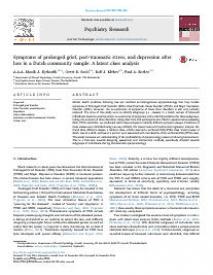Symptoms of prolonged grief, post-traumatic stress, and depression after loss in a Dutch community sample : A latent class analysis.
Abstract
Mental health problems following loss can manifest as heterogeneous symptomatology that may include symptoms of Prolonged Grief Disorder (PGD), Post-Traumatic Stress Disorder (PTSD), and Major Depressive Disorder (MDD). However, the co-occurrence of symptoms of these three disorders is still only partially explored. The aims of this study were to identify subgroups (i.e., classes) in a Dutch sample of bereaved individuals, based on severity and/or co-occurrence of symptoms and to identify predictors for these subgroups, taking into account all three disorders.
Using data from 496 participants who filled in questionnaires assessing PGD, PTSD and MDD, we conducted latent class analyses to identify different symptom classes. Predictors of these classes were identified using one-way ANOVA, Chi Square tests and multinomial regression analysis. We found three different classes: a resilient class, a PGD class and a combined PGD/PTSD class. Violent cause of death, loss of a child, and loss of a partner were associated with membership of the combined PGD/PTSD class.
This study increases our understanding of the predictability of symptomology outcome following bereavement. This is a first step towards designing assessment and intervention methods, specifically directed towards subgroups of individuals sharing characteristic symptomatology.
Geachte bezoeker,
De informatie die u nu opvraagt, kan door psychotraumanet niet aan u worden getoond. Dit kan verschillende redenen hebben,
waarvan (bescherming van het) auteursrecht de meeste voorkomende is. Wanneer het mogelijk is om u door te verwijzen naar de bron
van deze informatie, dan ziet u hier onder een link naar die plek.
Als er geen link staat, kunt u contact opnemen met de bibliotheek,
die u verder op weg kan helpen.
Met vriendelijke groet,
Het psychotraumanet-team.
In: Psychiatry Research, ISSN 0165-1781 | 247 | January | 276–281
http://dx.doi.org/10.1016/j.psychres.2016.11.023


